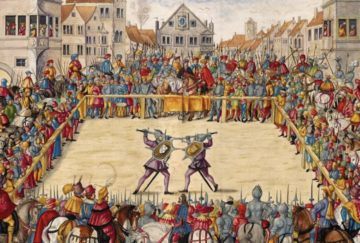Arran Lomas in Literary Hub:
 Up until the mid-thirteenth century, you would be fortunate if you were to be tried by a jury of your peers in the king’s court. Throughout the early Middle Ages, this particular court preferred trial by ordeal. The idea was that God favored the innocent, so the defendant would be put through an ordeal in which God would either help him prove his innocence or clarify his guilt. Commonly used methods were trial by cold water, in which the accused would have his hands and feet bound and be thrown into a body of water; if he floated, he was innocent, but if he sank, he was assumed guilty.
Up until the mid-thirteenth century, you would be fortunate if you were to be tried by a jury of your peers in the king’s court. Throughout the early Middle Ages, this particular court preferred trial by ordeal. The idea was that God favored the innocent, so the defendant would be put through an ordeal in which God would either help him prove his innocence or clarify his guilt. Commonly used methods were trial by cold water, in which the accused would have his hands and feet bound and be thrown into a body of water; if he floated, he was innocent, but if he sank, he was assumed guilty.
There was ordeal by hot iron or stone, in which the defendant was made to hold a lump of hot iron or plunge his hand into a pot of boiling water to fetch a stone. If his hand completely healed within three days, then, naturally, God had intervened, demonstrating his innocence. If scars still showed, he could expect a swift execution.
More here.
